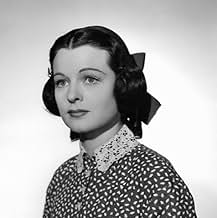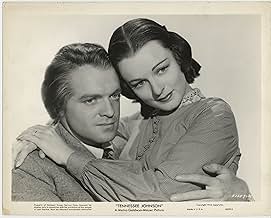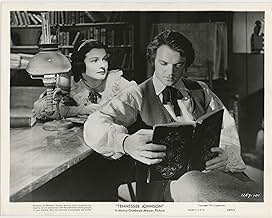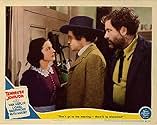Aggiungi una trama nella tua linguaBiography of Andrew Johnson, who followed Abraham Lincoln into office and became the first President of the United States ever to be impeached.Biography of Andrew Johnson, who followed Abraham Lincoln into office and became the first President of the United States ever to be impeached.Biography of Andrew Johnson, who followed Abraham Lincoln into office and became the first President of the United States ever to be impeached.
- Regia
- Sceneggiatura
- Star
- Sheriff Cass
- (as Noah Beery Sr.)
Recensioni in evidenza
The liberties taken by the screenwriters to make Johnson into a shining patriotic hero were so egregious to some that a protest movement formed against this movie, leading to picket lines and angry print editorials. Strangely enough, the most vocal opponents to the movie were Vincent Price and Zero Mostel! The movie is mostly malarkey, but so were so many "history lessons" coming out of Hollywood, so this one doesn't offend me that much. The purpose was to inspire and celebrate rather than inform or educate. If only it succeeded more at the former the lack of the latter wouldn't be so noticeable. The movie is clunky in its pacing, and can't decide what it really wants to say about its protagonists. Heflin and Hussey do as good a job as they were able given the material, but many of the supporting cast are wasted in nothing roles. The production design is nice, with detailed settings and nice costume work. Running about 105 minutes long, the movie really needed another 30 or so to add more depth and nuance to the players.
I wonder what kind of career he would have had if he had lived longer.
Watch this movie with an open mind and really enjoy Heflin's acting.
The accepted historical view of Andrew Johnson's presidency now is that had he been a bit more of a politician and also had been able to rise above the prejudices of his poor white class, the whole impeachment would never have happened. His actions through the use of the presidential veto in stalling the Reconstruction set racial equality in the USA aside for a century. Men of good will on both sides had they been willing to give a little might have settled on a compromise Reconstruction policy without all the rancor that characterized it and U.S. politics for decades.
The real story is Andy Johnson's rise to the presidency. As is showed here young Johnson arrives in Tennessee escaping a kind of slavery of his own. He was an indentured servant to a tailor and learned the trade, but after differences with his employer in his native North Carolina, Johnson escapes to Tennessee.
Andrew Johnson is the only United States president who never spent one day inside a school classroom. He was taught to read and write by the woman who later became Mrs. Johnson. There's was a real love story, one of the most romantic in our history.
Johnson's real moment of courage was after a slow rise up the political ladder that saw him elected as Mayor of Greenville, Tennessee, the state legislature, the House of Representatives, governor and then senator from Tennessee. In 1861 he was the only southern Senator to not walk out of the Senate when the south seceded. He became military governor of Tennessee when the Union Army captured enough of it to set up a government. Johnson's very life was in peril every minute from the firing on Fort Sumter to Lee's surrender at Appomattox. That's a story worth telling.
Unfortunately Johnson represented the poor white class in Tennessee and saw freed slaves as a rival labor force. He had all the prejudices of his class and wasn't hesitant to voice them. That part of the story is not told in Tennessee Johnson.
I did like Charles Dingle's performance as Senator Waters, why he wasn't given his real name in history of that of Ben Wade of Ohio is beyond me. As President Pro Tempore of the Senate with no sitting Vice President, he was first in line of succession had Johnson been impeached. From what I know of Ben Wade, Dingle fitted the role well.
Though it made good cinema, Andrew Johnson never addressed the Senate personally during his impeachment trial. There was an ill Senator who cast a deciding vote that saved Johnson's presidency. But unlike William Farnum's character of Senator Valley, James Grimes of Iowa had been felled by a stroke and no one expected him to be in the Senate that day. But he was carried in and voted not guilty.
The real story of Andrew Johnson is one of the most dramatic about one who turned out to be one of our worst presidents. Too bad it wasn't told in Tennessee Johnson.
"Robert Maxwell" wrote> It's generally agreed that at the second inauguration, Andrew Johnson was skunk drunk when he took the oath and tried to make his speech. I just watched the movie, "Tennessee Johnson," and it appears that Johnson was ill during the inauguration and that Lincoln later sent him a letter saying something like, "If you took a drink more often, you would know better than to take brandy on an empty stomach because you are ill. I know you only were there because I asked you to be."
Does anyone know if this letter ever existed?
Reply. "Having worked for three years as an assistant editor with The Papers of Andrew Johnson and as a member of the Board of Directors of the Abraham Lincoln Association, which is engaged in supporting projects to edit the papers of the sixteenth president, I can safely say that no one I know has ever claimed such a letter to exist."
Anyone interested in the impeachment of Johnson might watch the first 20 minutes of Blight's lecture on the subject, on open courses from Yale. Don't be intimidated by "college" or "Yale". (I went there and it's not that demanding.) Blight gives an informative, objective, and lively presentation of the material -- interrupted briefly by somebody yelling "Let my people go," to which Blight replies, "You're free to leave...I hope that guy doesn't have a gun."
http://academic earth.org/lectures/black-reconstruction-economics-of-land-and-labor
Please eliminate the space between "academic" and "earth". It's only there because IMDb.com doesn't allow words that are too long, like floccinaucinihilipilification.
Lo sapevi?
- QuizThere was a protest from some sectors that the film distorted the life of Thaddeus Stevens (who initiated the impeachment proceedings against President Andrew Johnson). Additional filming occurred in October 1942, but it is not known if it was because of these protests. One line in the script (Stevens referring to Lincoln as "the old ape") was eliminated. Still, the film treats Johnson much more favorably than it does Stevens.
- BlooperA key scene in the film depicts Johnson entering the Senate while it is debating his impeachment and removal from office, and making a major speech there in his defense. In reality, the actual President Johnson, despite his desire to confront his enemies in the Senate, never once entered or addressed that body during his impeachment trial.
- Citazioni
Jefferson Davis: I must pronounce our solemn farewell. Under these circumstances, of course, my functions - and those of my colleagues - terminate here. We but tread in the path of our fathers when we proclaim our independence - and take the hazard, putting our trust in God, and in our own firm hearts - and strong arms - we will vindicate the right as best we may.
[looking slowly around the room]
Jefferson Davis: I see now around me some with whom I have served long; there have been points of collision. For whatever offense I have given, I ask forgiveness. Of whatever of offense there has been to me, I leave here. I carry with me no hostile remembrance. I go hence unencumbered of the remembrance of injury received, and having discharged the duty of making the only reparation in my power for any injury offered.
[pausing]
Jefferson Davis: Mr. President; Senators - having made the announcement which the occasion seemed to me to require - it remains only for my colleagues and myself to bid you a final - adieu.
- Curiosità sui creditiThe opening outline includes a disclaimer about historical facts being changed for entertainment purposes.
- ConnessioniReferenced in Sheldon Hall on Omar Khayyam (2023)
- Colonne sonoreThe Battle Cry of Freedom
(1862)
Written by George Frederick Root
In the score during the foreword, reprised in the score for the last scene
I più visti
Dettagli
- Data di uscita
- Paese di origine
- Lingua
- Celebre anche come
- The Man on America's Conscience
- Luoghi delle riprese
- Azienda produttrice
- Vedi altri crediti dell’azienda su IMDbPro
- Tempo di esecuzione1 ora 43 minuti
- Colore
- Proporzioni
- 1.37 : 1






































